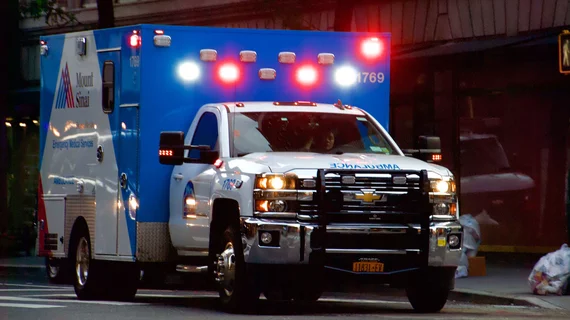More than 10% of cardiac arrest patients contacted EMS the day before
Trouble breathing was the most common symptom reported by patients who experienced cardiac arrest, while 1 in 10 patients reported their arrest to emergency medical services 24-hours before it occurred, according to research presented at the 2021 European Society of Cardiology Congress.
In the analysis, breathing problems were more common than chest pain among those who suffered a cardiac arrest episode. Compared to chest pain, however, patients with breathing complaints were less likely to receive emergency medical assistance and more likely to die within 30 days after the arrest, suggesting that breathing problems may be an underrated warning sign of cardiac arrest.
The aim of the study was to gain a better understanding of warning signs for out-of-hospital cardiac arrest that would allow medical professionals to determine whether a patient is at risk of developing a cardiac arrest and take measures to prevent it.
“Since difficulty breathing is also a sign of other health conditions, we hope our findings will stimulate further research to help emergency medical dispatchers distinguish between symptoms of a pre-arrest condition versus other medical issues,” said Filip Gnesin, a research scholar with North Zealand Hospital, Hillerød, Denmark, in a press release.
Researchers reviewed symptoms reported by patients from 2016 to 2018 who had an out-of-hospital cardiac arrest. Each had contacted emergency medical services at least 24 hours prior to the arrest.
Overall, 59.9% of the patients were men, and the median patient age with pre-arrest calls was 74 years old. All data came from the Danish Cardiac Arrest Registry. The pre-arrest calls were reviewed by the researchers, and the symptoms were reported by either the patient or someone else.
In addition, the patients were linked to nationwide databases that collected information such as survival rates.
Of 4,071 patients with out-of-hospital cardiac arrest, 481 (11.8%) had pre-arrest calls. Difficulty breathing was the most commonly reported symptom (59.4%), followed by confusion (23.0%), unconsciousness (20.2%), chest pain (19.5%) and paleness (19.1%).
The authors found that urgent medical response was sent in 68.7% of calls reporting breathing problems compared with 83.0% reporting chest pain. Eighty-one percent of patients who reported breathing problems in a pre-arrest call died within 30 days versus 47% of those reporting chest pain
“Although our study shows that some patients with cardiac arrest present characteristic pre-arrest symptoms, these symptoms are not unique to this patient population. We hope that creating awareness of breathing problems as a common early symptom of cardiac arrest will contribute, together with more research, to identifying more characteristics specific to cardiac arrest so that it can be predicted and possibly prevented in the future,” Gnesin said in the press release.
Read the ESC press release here.
